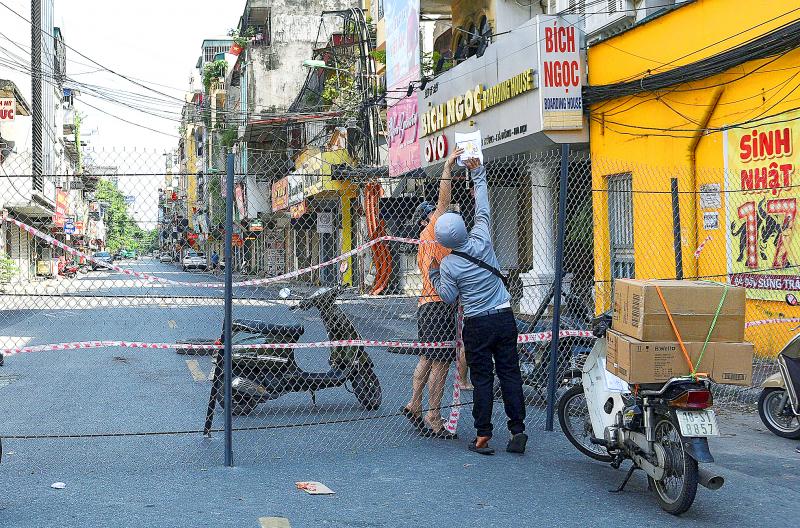Several Taiwanese manufacturers in Vietnam have been struggling with production problems over the past few weeks, as the country’s south remains under a COVID-19 lockdown.
Pou Chen Corp (寶成工業), an original design manufacturer for international footwear brands, said that production at its factory in Ho Chi Minh City has ground to a halt, so it expects a significant drop in revenue at that factory from July to last month.
If the COVID-19 outbreak in southern Vietnam subsides in the fourth quarter of this year and employees are allowed to return to work, they might be able to put in some overtime, which would make up for the third-quarter losses, Pou Chen said.

Photo: Reuters
In the south of Vietnam, the government’s strict lockdown order was on Thursday last week extended for at least another two weeks.
An executive at Pou Chen’s Vietnamese subsidiary said that the company has been adhering to government regulations and has been trying to speed up the vaccination of its 100,000 workers in an effort to help curb the COVID-19 outbreak.
The subsidiary manufactures shoes not only in Ho Chi Minh City, but also in Dong Nai and Tay Ninh provinces in southeastern Vietnam, as well as Tien Giang Province in the south, the executive said.
Another Taiwanese contract footwear maker, Feng Tay Enterprises Co (豐泰企業), said production at its Vietnamese factories has been suspended for about two months.
Feng Tay said it had planned to reassign production to China, Indonesia and India, but its factories in those countries are almost at full capacity, so it has decided to wait until it is allowed to resume work in Vietnam.
Its clients are aware of the situation and are prepared to wait, the company added.
Fu Sheng Industrial Co (復盛應用), a Taiwanese company that makes golf club heads, said its production in Vietnam had been suspended since the end of July, but it was optimistic that the situation would gradually return to normal in the fourth quarter, as the vaccination rate in Vietnam has been rising.
Fu Sheng said it would boost production when the Vietnamese government lifts the lockdown.
Some production has been reassigned to China to make up for the losses in Vietnam, but that has been limited because its factories in China are almost at full capacity, the company said.
Demand for golf club heads is strong in Japan, South Korea and the US, Fu Sheng added.

POWERING UP: PSUs for AI servers made up about 50% of Delta’s total server PSU revenue during the first three quarters of last year, the company said Power supply and electronic components maker Delta Electronics Inc (台達電) reported record-high revenue of NT$161.61 billion (US$5.11 billion) for last quarter and said it remains positive about this quarter. Last quarter’s figure was up 7.6 percent from the previous quarter and 41.51 percent higher than a year earlier, and largely in line with Yuanta Securities Investment Consulting Co’s (元大投顧) forecast of NT$160 billion. Delta’s annual revenue last year rose 31.76 percent year-on-year to NT$554.89 billion, also a record high for the company. Its strong performance reflected continued demand for high-performance power solutions and advanced liquid-cooling products used in artificial intelligence (AI) data centers,

SIZE MATTERS: TSMC started phasing out 8-inch wafer production last year, while Samsung is more aggressively retiring 8-inch capacity, TrendForce said Chipmakers are expected to raise prices of 8-inch wafers by up to 20 percent this year on concern over supply constraints as major contract chipmakers Taiwan Semiconductor Manufacturing Co (TSMC, 台積電) and Samsung Electronics Co gradually retire less advanced wafer capacity, TrendForce Corp (集邦科技) said yesterday. It is the first significant across-the-board price hike since a global semiconductor correction in 2023, the Taipei-based market researcher said in a report. Global 8-inch wafer capacity slid 0.3 percent year-on-year last year, although 8-inch wafer prices still hovered at relatively stable levels throughout the year, TrendForce said. The downward trend is expected to continue this year,

Vincent Wei led fellow Singaporean farmers around an empty Malaysian plot, laying out plans for a greenhouse and rows of leafy vegetables. What he pitched was not just space for crops, but a lifeline for growers struggling to make ends meet in a city-state with high prices and little vacant land. The future agriculture hub is part of a joint special economic zone launched last year by the two neighbors, expected to cost US$123 million and produce 10,000 tonnes of fresh produce annually. It is attracting Singaporean farmers with promises of cheaper land, labor and energy just over the border.

US actor Matthew McConaughey has filed recordings of his image and voice with US patent authorities to protect them from unauthorized usage by artificial intelligence (AI) platforms, a representative said earlier this week. Several video clips and audio recordings were registered by the commercial arm of the Just Keep Livin’ Foundation, a non-profit created by the Oscar-winning actor and his wife, Camila, according to the US Patent and Trademark Office database. Many artists are increasingly concerned about the uncontrolled use of their image via generative AI since the rollout of ChatGPT and other AI-powered tools. Several US states have adopted